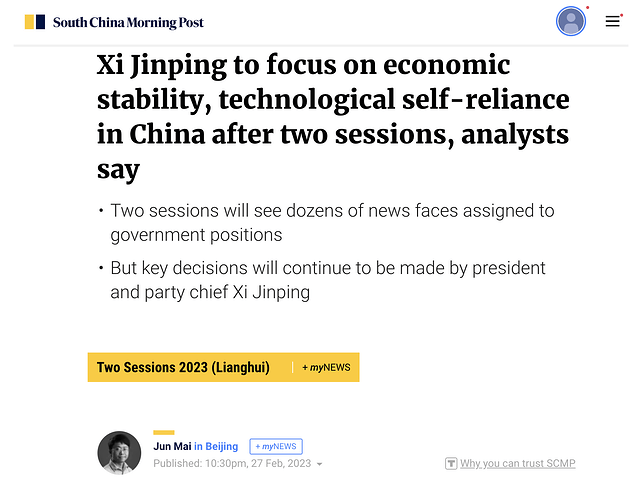-
中国的最高政府职位正处于五年一次的过渡模式,全国人民代表大会和中国人民政治协商会议(又称 “两会”)的年度会议正在举行。
-
习近平在党代会上获得了第三个党的总书记任期,他正在监督中国放弃近三年来的零关税政策。
-
专家们认为,中国政府将回归政策常态,并将重点放在技术自力更生等长期目标上。
-
墨卡托中国研究所的分析师Nis Gruenberg认为,习近平正在努力恢复长期稳定,并实施他制定的长期目标。
-
格鲁恩伯格还预计,政治监督将正常化,并有空间对冲击作出务实的反应。
-
芝加哥大学的政治学家杨大利认为,中国的当务之急是让国家恢复。
-
在10月的党代会上,数十名从共产党员中提拔出来的新面孔将在下个月被派往政府岗位,中国正专注于经济增长和创造就业机会。
-
习近平的亲信李强有望被任命为中国的新总理
-
这将是自2012年以来首次由与习近平密切合作的人担任总理职务。
-
有共青团背景的高级领导人李克强预计将离开政府高层职位
-
张东认为,习近平与李强的密切关系可能会给新总理更多的余地。
-
习近平可能会更倾向于赞同李强提出的政策。
-
但这也有弊端,因为李强可能会迎合习近平的口味,报告他喜欢听的内容。
-
习近平十年来将决策权集中在党内的计划将使国务院变得更弱。
-
李强在中国的体制中仍然很重要,但与前任相比会有所削弱。
-
李强需要时间来拥有一系列的问题。
-
习近平在2012年掌权后,就广泛的经济和工业问题成立了少数几个党的领导小组,全部由他本人主持。
-
他还恢复了前党魁很少使用的经济事务党小组,并多次呼吁 “党对管理经济的领导”。
-
2018年,北京推出了一项影响深远的党政改革,以进一步维护共产党对一系列问题的控制权,将以前由国务院监管的一些项目移交给党。
-
在他的两个五年任期内,与他的前任相比,李克强在关键政策上的印记明显缩小。
-
张建国说,由于大多数关键的政府职位由他的门生担任,习近平将努力平衡他们在国务院的权力。
-
格鲁恩伯格说,他预计新领导层在执行习近平的政策方向时将 “非常有成效”。
-
格鲁恩伯格说,政治局中也有更多的 “党员士兵”,如统战部部长石泰峰,他们在党的机关有几十年的经验。
-
他说,新疆党委书记马兴瑞、重庆党委书记袁家军和前天津党委书记张国清都是新晋的24人政治局委员,是推动习近平技术独立愿景的理想人选。
-
这三人都在航天部门和国防工业领域有数十年的经验,而且他们是在最近几年才进入政界的。
-
尼尔-托马斯认为,习近平安排了可能是有史以来受教育程度最高的党中央委员会的人选。
-
在其205名正式成员和171名候补成员中,49.5%是技术专家,高于2012年的37.2%,7.7%是科学、技术、工程或数学方面的高级学者,高于2012年的4%。
-
格鲁恩伯格说,他们不仅仅是习近平的 “yes men”,必须是 “红色和专业”。
-
北京已将其政策重点转回经济增长,并对私营部门,包括大科技和房地产,大唱赞歌。
-
习近平还加倍强调了他以前对技术自力更生的呼吁,并称赞中国的发展道路是西方的成功替代方案。
-
杨大利说,习近平不太可能在短期内推出重大的政策变化,因为他在扶贫等领域的以往成就上站得住脚。
-
北京将把重点放在经济增长的稳定性上,提高增长的质量和建立自力更生。
-
中国国家主席习近平预计将在立法机构的年度会议上开始他的第三个总统任期。
-
习近平没有明确的继任者,何时可能出现继任者也不得而知。
-
知道了继任者,可以使人们开始联网,在他们身后排队,也可以挑战他们。
-
然而,没有继任者会造成更大的不确定性。
-
习近平的继任者是最大的 “灰犀牛”,也是一个已知的问题,但何时会成为一个问题还不得而知。
-
China’s top government positions are in five-yearly transition mode and the annual meetings of the National People’s Congress and Chinese People’s Political Consultative Conference, also known as the “two sessions”, are taking place.
-
Xi Jinping, who secured a third term as party general secretary at the party congress, is overseeing the abandonment of China’s almost three-year-old zero-Covid policy.
-
Experts believe Beijing will return to policy normality and focus on long-term goals such as technological self-reliance.
-
Mercator Institute for China Studies analyst Nis Gruenberg believes Xi is trying to get back to stability in the long term and implement the long term-targets he has set out.
-
Gruenberg also expects a normalisation of political oversight with room for pragmatic reactions to shocks.
-
Dali Yang, a political scientist at the University of Chicago, believes the utmost priority for China is to let the country recover.
-
With dozens of new faces promoted from the Communist Party’s rank and file at October’s party congress to be assigned to their government positions next month, China is focusing on economic growth and job creation.
-
Li Qiang, a Xi protégé, is expected to be appointed as China’s new premier
-
This will be the first time since 2012 that the premiership has been held by someone who has worked closely with Xi
-
Senior leaders with backgrounds in the Communist Youth League are expected to leave top government positions
-
Dong Zhang believes Xi’s close relationship with Li Qiang might give the new premier more leeway
-
Xi may be more likely to endorse the policies proposed by Li Qiang
-
There is a downside to this as Li Qiang may cater to Xi’s taste and report what he likes to hear
-
Xi’s decade-long project to concentrate decision-making power in the party will leave the State Council weaker
-
Li Qiang will still be important in the Chinese system, but weakened compared to predecessors
-
It will take time for Li Qiang to own a range of issues.
-
After Xi took the helm of the party in 2012, he founded a handful of party leadership groups on a wide range of economic and industrial issues, all chaired by himself.
-
He also revived a party group on economic affairs that had seldom been used by former party leaders, and repeatedly called for “the party’s leadership on managing the economy”.
-
In 2018, Beijing introduced a far-reaching party and government overhaul to further assert the Communist Party’s control over a range of issues, transferring some portfolios previously under the watch of the State Council to the party.
-
During his two five-year terms, Li Keqiang’s imprint on key policies shrank significantly compared to his predecessors.
-
Zhang said that with most key government positions filled by his protégés, Xi would try to balance their powers on the State Council.
-
Gruenberg said he expected the new leadership to be “very productive” when implementing Xi’s policy directions.
-
Gruenberg said there were also more “party soldiers” in the Politburo, like United Front Work Department head Shi Taifeng, with decades of experience in party organs under their belts.
-
He said Xinjiang party chief Ma Xingrui, Chongqing party chief Yuan Jiajun and former Tianjin party chief Zhang Guoqing, all newly promoted to the 24-member Politburo, were ideal candidates to drive Xi’s vision of technological independence.
-
All three had decades of experience in the space sector and defence industry, and they had only entered politics in recent years.
-
Neil Thomas argued that Xi had arranged the selection of what may be the most educated party Central Committee ever.
-
49.5% of its 205 full members and 171 alternate members were technocrats, up from 37.2% in 2012, and 7.7% were senior scholars in science, technology, engineering or mathematics, up from 4% in 2012.
-
Gruenberg said they were not merely Xi “yes men” and must be “red and professional”.
-
Beijing has shifted its policy focus back to economic growth and sung the praises of the private sector, including big tech and real estate.
-
Xi has also doubled down on his previous call for technological self-reliance and hailed China’s development path as a successful alternative to the West’s.
-
Yang said that Xi is unlikely to roll out major policy changes any time soon, as he is standing comfortably on previous achievements in areas such as poverty alleviation.
-
Beijing will focus on stability in economic growth, improving the quality of growth and building up self-reliance.
-
Chinese President Xi Jinping is expected to begin his third presidential term in the legislature’s annual session.
-
There is no clear successor to Xi and it is not known when one may emerge.
-
Having a successor known can cause people to start networking and line up behind them, as well as challenge them.
-
However, not having a successor can create even more uncertainty.
-
Xi’s succession is the biggest “grey rhino” and a problem that is known but the timing of when it will become a problem is unknown.
